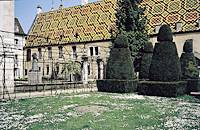|
|
|

|
A man named Nicolas Rolin...
1440 : faced with the distress of the people marked by the Hundred Years War, Nicolas
Rolin, Chancelor of the Duke of Bourgogne Philippe le Bon, and his wife Giugone de Salins
decided to create a pious foundation.
Admired for his administrative, political, and financial actions, Rolin acquired a true
humanistic dimension by having a hospital constructed for the sick and the deprived. The
Hôtel-Dieu was created. This unique social organization rapidly gained a wide response,
well beyond the borders of the dukedom.
Unfortunately the institution was coveted, and the founder, intent on preserving its
independence, informed Philippe le Bon about the situation. By letters of patent he thus
obtained total exemption from taxes and feudal tributes, and from all other services or
taxes due to the duke. The protection of the Hôtel-Dieu is then turned over to the
Almighty, as the Pope Eugene IV placed the charity organization under the guardianship of
the episcopal see by a note dated September 8, 1441. Freed from the yoke of the Autun
bishops and of all other clerical coercion, the hospital enjoyed total freedom.
August 4, 1443 : the founding of the
Hôtel-Dieu of Beaune is officially proclaimed by a solemn deed. The text leaves no
ambiguity concerning the mission of the Hôtel-Dieu: "I, Nicolas Rolin (...),
recognizing the grace and the belongings which God, source of all good, has gratified me;
from now on, for ever and irrevocably, I found, construct, and date in the town of Beaune,
in the diocese of Autun, a hospital to receive, serve and house the sick poor, with a
chapel in honor of God the Almighty and of his glorious mother the virgin Mary, in memory
of and to venerate Saint Anthony, abbot, dedicated to him and his name, to give it the
belongings which God bestowed upon me." For his legitimate protection, Sir Rolin
specified the missions of his organization : thus every morning "white bread must be
given to the poor asking for alms before the doors of the hospital". Everything is
done so the poor "be received there, fed and cared for, at the expense of the
hospital, until they regain their health or are convalescent".
 |
|
January 1, 1452 : the first patient is
received at the hospital. The founder Nicolas Rolin naturally took charge of supervising
the administration. This function allowed him to arrange almost all administrative tasks
(conditions for hiring priests, working and receiving rules, annual income of the
hospital, etc.).
|
August 31, 1459 : this organization is
codified by the proclamation of a charter ruling the entire management of the Hôtel-Dieu,
and which is still valid to this date. This charter had only one condition : the function
of superintendent was to be hereditary. This clause was respected until the end of the Old
Regime. In exchange the Rolins renounced all property or income from the Hospital's
property. Thus, Jean Rolin succeeded his father in 1462, upon the chancellor's death.
1789 : The trouble caused by the
revolution led to depredations. Renamed the Hôpital d'Humanité, the Hôtel-Dieu
underwent financial difficulties; the situation deteriorated with the destruction of the
window above the chapel's main altar and the profanation of Giugone de Salins' burial
place. Luckily, the situation progressively got better again.
1810 : a decree by Napoleon
entirely restored the status of the nuns which had fallen during the anti-clerical phase
in 1792. Protected from personal and state desires since its foundation, thanks to Nicolas
Rolin's energy and spirit of organization, the Hôtel-Dieu has managed - with some pains!
- to cross the centuries and to pursue its charity mission.

|
|

